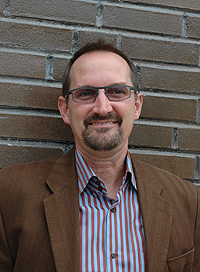Berkeleyan
The poetic commuter
HR director, 'synthetic by nature,' writes his verses in transit
![]()
| 21 September 2005
 David Scronce (Wendy Edelstein photo) |
This past summer Scronce, director of strategic initiatives for the Office of Human Resources, attended the Squaw Valley program for the second time. He and 65 fellow poets wrote new poems daily, then shared their work in groups of 15, each of which was directed by a different established poet each day. Unlike many writers' groups, though, the focus at Squaw Valley isn't on critiquing the poem and telling the writer what's wrong with it.
"They do what we would call in HR 'appreciative inquiry,'" says Scronce wryly. What that means, he explains, is that participants listen to one another's poems, then respond to what moves or excites them. Poet Galway Kinnell, who created the Squaw Valley program with Sharon Olds, "doesn't want you to trash anyone's poem, because every poet is going to turn right back around and write something new and bring it in raw the very next day," says Scronce. "You're doing this for a week, so you want people to feel a sense of permission and openness."
Inspiration - or at least the impulse to try a new approach - often comes less frequently from direct feedback on one's own poems than from "something you hear or read, or a comment one of the other poets makes about their own work," observes Scronce. He had such an experience this summer, when another poet began musing about prose poems and how they differ from other poems. Through a regionalism Scronce had used in a piece he read the first day, the two poets discovered that they both hailed from North Carolina.
"I took the notion of my origins in North Carolina and started writing prose poems about them," says Scronce, who, never having written in the form before, penned seven of them that week. (He typically writes "these rather elliptical things with short lines.")
The Problem With Empiricism If there's no hue in blue jays wings © 2005 David Scronce |
Several years ago, when Scronce still worked at the UC Office of the President, he was dubbed "the clarity freak" because he was "always driving to closure and using processes of analysis to break things down into their atomic parts."
Poetry, which involves assembling separate and often disparate elements to form a complex whole, is about as removed from simple lucidity as one can get. As Scronce explains it: "I'm analytic by training and synthetic by nature."
While most writers yearn for "a room of their own," Scronce composes many of his poems in a place both public yet anonymous - the BART train on which he commutes from San Francisco to Berkeley. "Apparently Jane Austen wrote in a drawing room with every member of her family gossiping and playing cards in front of her," says Scronce. "I write among perfect strangers on the train every day. My handwriting is so bad that I know they're not reading over my shoulder."
Scronce currently is taking master classes with David St. John, chair of the creative-writing department at the University of Southern California, who leads seminars several weekends throughout the year. He also participates in "a virtual writers' group" - four other poets with whom he sometimes exchanges a poem each day via e-mail. The rhythm of the daily back-and-forth, he says, often leads to "poems that are different from my day-to-day work." The knowledge that the other writers will read the poem, then respond in kind with a piece of their own in addition to feedback, sometimes leads the writers to "start riffing off of each other, almost in the way jazz musicians do."
If Scronce were a jazz musician, his playing might resemble that of the minimalist trumpeter Miles Davis, since he "loves compression and wants to make each poem as tight as it can be."
David Scronce's poems have appeared in Squaw Valley Review 2003, Modern Words #8 (2004), and Cloud View Poets (2005), an anthology of poems written by participants in David St. John's master classes.

